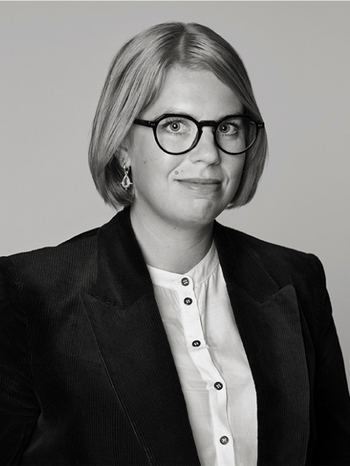Inger Ekdahl
Untitled
Signed Inger Ekdahl and dated 1988 on verso. Canvas 61 x 61 cm.
More information
Inger Ekdahl var en de första kvinnorna i Sverige som arbetade med nonfigurativ konst. Hennes skapande gick från rytmiska stänk till optiskt raffinerade formspel. Med raka linjer och geometrisk precision satte hon bildernas yta i rörelse.
Ekdahl föddes i Ystad 1922 och bröt med sin borgerliga uppväxt när hon bestämde sig för att bli konstnär. Efter att ha träffat sin man, konstnären Erik H Olson, studerade hon för målaren Isaac Grünewald och Otte Sköld. Men det var parets resor i Europa, till Schweiz, Italien och Frankrike som blev avgörande för hennes konstnärliga utveckling.
Som en del av avantgardescenen i 1950-talets Paris mötte hon såväl konkretismen med dess sakliga färgfält, som den informella konstens dragning åt det spontana och upplösta. Än viktigare var influenserna från den amerikanska abstrakta expressionismen, där konstnärer likt Jackson Pollock och Lee Krasner droppade och stänkte färg över duken. I motsats till deras spontana action painting, som vibrerade av nervig energi, byggde Inger Ekdahls teknik redan då på noggrann planering.
Ekdahl täckte dukar och masonitskivor med vitt, blått eller svart och lät sedan lackfärg rinna och droppa mot underlaget. Resultatet påminner ibland om komplexa, intuitivt framvuxna sol- och stjärnsystem. I Paris mötte de även konstnärer som Jean Arp och Victor Vasarely som inspirerade till hennes geometriska men visuellt lekfulla kompositioner, som kom att bli hennes kännetecken under 1960-talet. Verk som utmanade ögats uppfattning av yta och djup, perspektiv och volym genom svindlande grafiska mönster.
Ekdahl dog 2014 och hennes konstnärliga kvarlåtenskap donerades till Ystads konstmuseum. I och med hennes bortgång har hennes konstnärskap aktualiserats med ett flertal utställningar, senast tillsammans med Ragna Bley på Malmö konsthall i år.
Artist
Inger Ekdahl was the first woman in Sweden to work with non-figurative art. Her work evolved from rhythmic splashes to optically refined play of forms. With straight lines and geometric precision, she cements movement onto her canvases.
Ekdahl was born in Ystad 1922 and distanced herself from her bourgeois upbringing to become an artist. After meeting her husband, the artist Erik H Olson, she studied painting under the tutorship of Isaac Grünewald and Otte Sköld. Yet it was the couple's trips to Europe and their travels to Switzerland, Italy and France which became critical for her artistic development.
As a part of the avant-garde schene in 1950s Paris, Ekdahl she encountered both concretism with its objective color fields and the informal art’s inclination towards the spontaneous and dissolved. Even more critical was the influences from the American abstract expressionistic movement, where artists such as Jackson Pollock and Lee Krasner would drop and lower colour across the canvas. In contrast to their spontaneous dynamic paintings, which vibrated with nervous energy, the foundations of Ekdahl's techniques are born out of detailed planning.
Ekdahl covered her canvases and masonite boards with white, blue or black and then let the colours roll and drop towards the base. The result is reminicsent of complex, intuitive sun and star system. In Paris, Ekdahl met the artists Jean Arp and Victor Vasarely who inspired her geometric yet visually playful compositions, which become an identifier of her art during the 1960s. Artworks which challenged the eye's understanding of the surface and pictoral depth, perspective and volume through dizzying graphic patterns.
Ekdahl died in 2014 and her artistic estate was donated to the Ystad Art Museum. With her passing, her artistic career has been highlighted with several exhibitions, most recently with Ragna Bley at Malmö Art Hall in 2020.
Read more































